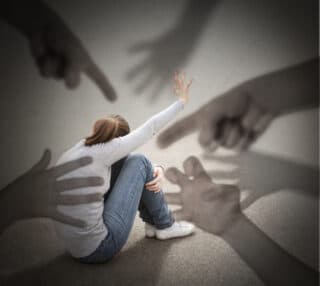
More Mental Health Articles
Schizophrenia: Serious, But Treatable

Schizophrenia is a serious, but treatable illness which affects the brain. One person in 100 has this illness. It is a disease that makes it difficult for an individual to tell the difference between real and unreal experiences, to think logically or to have a normal emotional response. Sleeping and remembering may be difficult.
Symptoms usually appear slowly over months, though they may occur suddenly. At times symptoms may be confused with those of other conditions. A person may feel tense, have difficulty concentrating or sleeping. Often there is a tendency to withdraw from activity. It may be hard to make or keep friends. Not caring about appearance, dropping out of school or poor work performance may be signs of schizophrenia.
As the illness progresses, symptoms of psychosis appear. These can vary. A person may begin to act or speak strangely. Hallucinations may develop. A person sees, feels, smells, and hears things that are not really there. There may be physical symptoms, unusual movements or the person may sit or stand in strange positions. Some people become almost motionless, while others may move constantly.
Without proper diagnosis and treatment, symptoms tend to come and go. Getting appropriate treatment can break this cycle. Proper treatment usually can control symptoms just as insulin controls diabetes. Most people can lead productive, satisfying lives.
Like many illnesses, primary treatment is medication and learning to manage the illness. The major medications used are called neuropletic medicines. They work by changing the balance of the chemicals in the brain.
Although these medicines may effectively control symptoms of the illness, they often may create side effects of their own; muscle spasms, restlessness, tremors, grimacing. There are new medications under development which take advantage of improved knowledge and technology. They promise to be more effective and create less side effects.
Structured support can be helpful in assisting the person to regain a stable environment. Psychiatric rehabilitation is one option which serves this function. Staff can facilitate activities in the person’s home or in a program where group support is available.
Recognizing particular stressors that impact a person’s life and what symptoms may be an indicator of potential relapse help prevent recurring episodes of the illness. Reduction of stressors, medication adjustment, and added support are the treatments of choice. Often hospitalization can be avoided and the person can continue to participate in the daily activities of living.
Schizophrenia is a long term illness which can be successfully managed once understood and treated.
Other Articles You May Find of Interest...
- The Challenges of Being an LGBTQ+ Parent
- Embracing Healing: Navigating the Emotional and Physical Journey of Mastectomy Recovery
- Understanding the Role of Support Groups in Personal Development
- Ways To Check On a ‘Mama’ In Your Life
- How to get rid of stress
- The Impact Of Mental Illness
- Healthy Mind In a Healthy Body

















